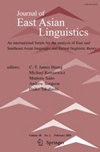用普通话控制公开科目
IF 0.5
3区 文学
0 LANGUAGE & LINGUISTICS
引用次数: 0
摘要
在不同的语言中都观察到了明显的反义词,而对于是否将其分析为词汇化的PRO,以往的建议存在分歧。在本研究中,我们从普通话中提出了关于非 PRO 明显控制词的新证据:我们认为,虽然在控制动词下嵌入公开主语的结构确实是强制性控制,但公开控制词不应被分析为词化的 PRO。根据公开控制词的分布和行为,本研究还证明了穷尽控制和部分控制之间的结构差异,为最近关于控制结构和普通话分句结构的理论建议提供了独立的证据。本文章由计算机程序翻译,如有差异,请以英文原文为准。
Controlling overt subjects in Mandarin
Overt controlees have been observed in different languages, and previous proposals diverge on whether to analyze them as lexicalized PROs or not. In this study, we present new evidence from Mandarin for non-PRO overt controlees: We argue that although the construction of embedding overt subjects under control verbs is indeed obligatory control, the overt controlees should not be analyzed as lexicalized PROs. Based on the distribution and behavior of overt controlees, this study also demonstrates a structural difference between exhaustive control and partial control, offering independent evidence for recent theoretical proposals on the structure of control and Mandarin clause structure.
求助全文
通过发布文献求助,成功后即可免费获取论文全文。
去求助
来源期刊

Journal of East Asian Linguistics
Multiple-
CiteScore
0.90
自引率
0.00%
发文量
13
期刊介绍:
The study of East Asian languages, especially of Chinese, Japanese and Korean, has existed for a long time as a field, as demonstrated by the existence of programs in most institutions of higher learning and research that include these languages as a major component. Speakers of these three languages have shared a great deal of linguistic heritage during the development of their languages through cultural contacts, in addition to possible genealogical linkage. These languages accordingly possess various common features. Another important factor that ties them together as a field is that they have shared a common tradition of linguistic scholarship, a tradition that distinguishes itself from the study of western languages. Against this tradition, much recent work has approached these languages from a broader perspective beyond the area, considering them within contexts of general theoretical research, bringing new lights to old problems in the area and contributing to current issues in linguistic theory. But there continues to be good reason for scholars working in this approach to hold a special interest in each other''s work. Especially with the amount of most recent theoretical work on these languages, the field of theoretical East Asian linguistics has been fast growing. The purpose of the Journal of East Asian Linguistics is to provide a common forum for such scholarly activities, and to foster further growth that will allow the field to benefit more from linguistic theory of today, and enable the languages to play a more important role in shaping linguistic theory of tomorrow.
 求助内容:
求助内容: 应助结果提醒方式:
应助结果提醒方式:


